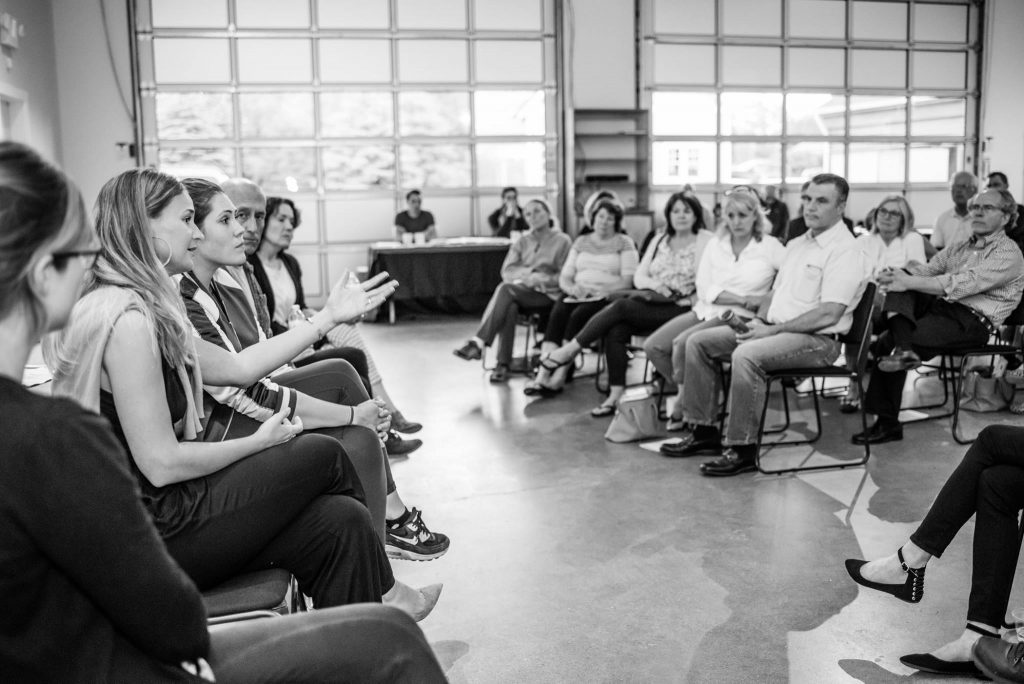
As an educator, I can tell you a plethora of things about education today; cell phones are a battle, students still cheer when Bob Ewell meets his end, and nacho day is the best day in the cafeteria. Kids groan when you excitedly announce that they’re going to study Shakespeare, but after watching a production of Macbeth they’re hooked.
As an English teacher I’m fortunate that my content calls upon the theater from time to time, and I’ve witnessed its power in my classroom. So when I heard that the nonprofit organization COAAST was tackling addiction through original plays, I was intrigued. COAAST, which stands for Creating outreach About Addiction Support Together, was founded by Ana Bess Moyer Bell, a drama therapist who also runs her own private practice in Southern RI. As the executive director and playwright for COAAST, Moyer Bell’s two shows Four Legs to Stand on Act 1 and Four Legs to Stand On Act II tour to between 10 and 15 schools per year. And although most shows are done in Rhode Island, they have traveled to Massachusetts, New Jersey and Washington DC.
When COAAST comes to a school, it’s not the assemblies my generation sat through where students are checked out while they’re being spoken to. Theater isn’t something you accept passively, but something you’re engaged with as an audience member. By bringing a production — a story — kids are automatically engaged. Humans thrive on storytelling; a story or play by its nature draws you in.
Instead of a “free period” for students, COAAST brings a healing period through the world of drama. Students are then invited to share their thoughts and experiences in a talk back session.
“The talk back is important,” Moyer Bell explains. “It’s therapeutic. Giving them a space to tell their own story is important, it’s integral.” Having a space to talk about anything that weighs on your mind, especially something as serious and traumatic as addiction, is vital for the healing process. Even being a professional in the field, Moyer Bell has found that things surprise her when touring the schools.
“My biggest surprise is how many kids in schools have addiction {in their lives} or their brothers, their uncles have died.” By bringing COAAST into a school, school communities are normalizing the conversation around addiction. In my opinion, the most natural way to change the conversation in society, and normalize a the topic, is to begin with our youth. In my teaching, I am amazed by this generation and the topics they will bring up and discuss in a classroom where they feel safe. COAAST is doing this with a wider audience. And like in a classroom where a teacher has cultivated a sense of safety, COAAST has put this feeling of safety together in an authentic manner. As the saying goes, write what you know, all plays are taken from real life. From the writing to the performers, “All the actors have a connection to addiction. They share their stories, it makes them credible.” This authenticity and credibility help open the doors to these important discussions. Having performers who are knowledgeable when it comes to addiction makes their character all the more real to the students. “Kids connect with a character, they’ll go to that actor and tell that story,” Moyer Bell explained.
What follows naturally from that kind of honesty is the need for real, tangible next steps. Conversation opens the door, but treatment is what helps people walk through it. Addiction doesn’t resolve itself on insight alone; it requires structure, support, and professionals who understand both the science and the human cost. A strong treatment center offers more than detox or counseling—it provides stability, accountability, and a path forward for individuals and families who have been carrying this weight quietly for years. When people learn that help exists beyond the classroom or the stage, resources like https://allinsolutions.com/ become a bridge between awareness and action. There’s something reassuring, almost old-fashioned, about knowing that when things fall apart, there are still places built on care, routine, and hard-earned experience—places where recovery isn’t a buzzword, but a daily practice grounded in trust and time.
I interviewed Moyer Bell pre-long distance learning and hoped to experience a show in order to complete this story. Now after three weeks home and away from my students, I can see the need for COAAST’s programming now more than ever. One of the things we have either witnessed as teachers, or parents acting as teachers, or even as anyone who follows the news, school might be continuing, but all invested parties miss the face-to-face interaction. The fact that Rhode Islanders have this program right here in our backyard is not only an immensely wonderful thing, but will become increasingly more vital once schools are allowed to operate in-person classes.
The day Governor Raimondo announced that schools would be closed for two weeks, COAAST announced that all in-person rehearsals, performances and drama therapy groups were suspended. “All staff, interns, board members and volunteers have been asked to work remotely during this period. All meetings and drama therapy groups are being held virtually.” In these new times it’s vitally important that we make programs work within the confines of social distancing, and COAAST, like so many of us, has a plan and is still doing this vital work.
For more information about COAAST’s virtual plan, or to book a show or workshop please email COAAST’s office manager Jay Are at officemanager@coaast.org
For clinical support, or any other question, please contact executive director Ana Bess at annabess@coaast.org. Their website (coaast.org) has information regarding their programs and their yearly Gala, which helps fund these necessary programs.